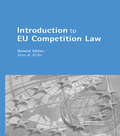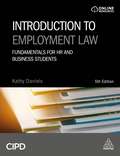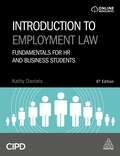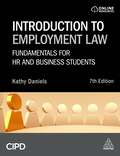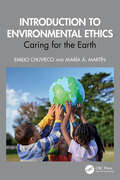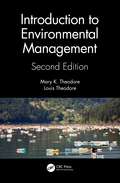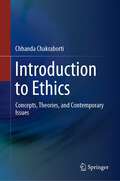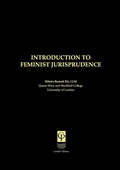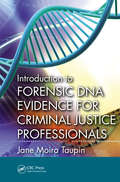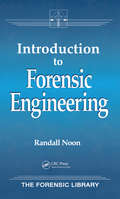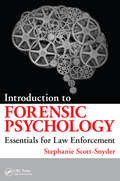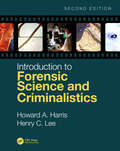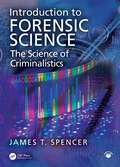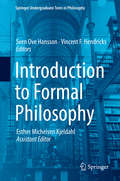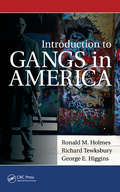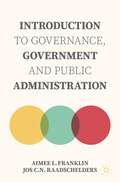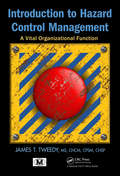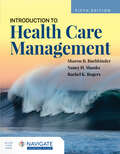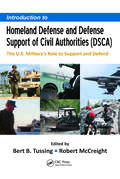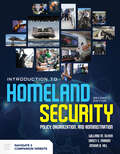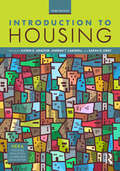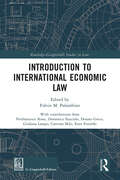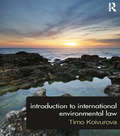- Table View
- List View
Introduction to EU Competition Law
by Peter WillisThis book provides an introductory but thorough guide to EU competition law, covering the underlying economics, and the key substantive areas of anticompetitive agreements (Article 81), abuses of dominance (Article 82), the application to the most common types of commercial agreement, state aids, state measures limiting competition and mergers. It also examines the procedures under which the relevant competition authorities apply the rules, private enforcement of the rules before the courts, and minimising risk by implementing a compliance programme. The emphasis is practical rather than theoretical: the authors are practitioners in the field of competition law and economics, with many years’ individual and collective experience in the area. This will be an essential reference tool for practitioners, academics and students of EU Competition Law.
Introduction to Employment Law: Fundamentals for HR and Business Students
by Kathy DanielsWritten specifically for HR and Business students, Introduction to Employment Law is a clear and accessible guide to employment law and how it applies in practice. Covering everything from employment tribunals and discrimination to redundancy and termination of employment, this textbook doesn't assume any prior knowledge of the UK legal system and equips students with all the knowledge and skills that they need to take forward into the workplace.Fully revised with all the latest cases and legal developments, this new edition includes coverage of hot topics such as defining employment status in the gig economy, gender pay reporting, the General Data Protection Regulation (GDPR) and the legal implications to be considered with Britain's withdrawal from the European Union. Packed with pedagogical features to consolidate learning including chapter objectives, tasks, 'explore further' sections, key learning points and examples to work through, as well as a dedicated study skills chapter, Introduction to Employment Law is essential reading for all students studying the CIPD Level 5 Intermediate module in employment law as well as being a useful resource for those studying at level 3 and an accessible introduction for level 7 and those on undergraduate and postgraduate courses needing a thorough grounding in employment law. Online resources include lecture slides, case studies, multiple choice questions, annotated weblinks and an instructor's manual.
Introduction to Employment Law: Fundamentals for HR and Business Students
by Kathy DanielsWritten specifically for HR and business students, Introduction to Employment Law is a clear, accessible and jargon-free guide to UK employment law and how it applies in practice. This book covers all the essentials of employment law including employment contracts, discrimination, redundancy and employment tribunals. There is also expert guidance on key issues including shared parental leave, flexible working policies and protected characteristics. Fully revised with the latest cases and legal developments, this new edition includes coverage of the rights of agency workers, bereavement leave, furlough practices and the legal implications of Brexit. This textbook doesn't assume any prior knowledge of the UK legal system and equips students with the knowledge and skills that they need to take forward into the workplace. Packed with pedagogical features to consolidate learning including tasks, examples, explore further sections and key learning points as well as a dedicated study skills chapter covering employment law assignments and exams, Introduction to Employment Law is essential reading for all students studying the CIPD Level 5 Intermediate module in employment law. It is also an accessible introduction for Level 7 students and those on undergraduate and postgraduate business courses needing a thorough grounding in employment law. Online resources include lecture slides, case studies, annotated weblinks and an instructor's manual.
Introduction to Employment Law: Fundamentals for HR and Business Students
by Kathy DanielsIntroduction to Employment Law is a clear, accessible and jargon-free guide to UK employment law and its application in the workplace. Written specifically for HR and business students, this book provides a thorough grounding in the essentials of employment law. All areas of employment law are addressed, including employment contracts, discrimination, redundancy and the legal duties of both the employer and the employee. This new edition has been updated throughout to cover the latest case law and legal developments including changes to annual leave, areas of family leave including Carer's Leave and developments in discrimination legislation. Assuming no prior knowledge of the UK legal system, this is ideal reading for all those studying the specialist employment law module on the CIPD Associate Diploma. It is also an accessible introduction for Advanced Diploma students and those on general business degrees who need an introduction to UK employment law. This book is packed with pedagogical features to help consolidate learning including tasks, examples, explore further sections, key learning points and a dedicated study skills chapter. Online resources include lecture slides, case studies, weblinks, multiple choice questions and an instructor's manual.
Introduction to Energy and Climate: Developing a Sustainable Environment
by Julie KerrThe purpose of this textbook is to provide a well-rounded working knowledge of both climate change and environmental sustainability for a wide range of students. Students will learn core concepts and methods to analyze energy and environmental impacts; will understand what is changing the earth’s climate, and what that means for life on earth now and in the future. They will also have a firm understanding of what energy is and how it can be used. This text intends to develop working knowledge of these topics, with both technical and social implications. Students will find in one volume the integration and careful treatment of climate, energy, and sustainability.
Introduction to Environmental Ethics: Caring for the Earth
by Emilio Chuvieco Maria A. MartinA comprehensive introductory textbook that integrates environmental ethics with social and religious perspectives, this cross-disciplinary approach helps students understand the depth and breadth of environmental issues in a globally relevant way. Environmental problems are explained by ecological, social, ethical, and religious dimensions that inspire environmental conservation. It underlines the reasons why intrinsic values of nature, and those who inhabit it, must be taken into consideration when making decisions that affect them. This book is also intended for those interested in understanding the environmental debate which is a critical component of environmental management.Features Presents the historical review of the environmental movement. Introduces ethical reasoning in environmental problems. Explains environmental ethic approaches and practical implications. Discusses the role of religions in nature conservation and Eco-theology. Includes exercises for reflection in each chapter to stimulate student engagement with environmental issues. This great textbook gives readers new insight into caring for the environment. It is for undergraduate and graduate students taking courses in environmental studies, geography, sociology, anthropology, and philosophy, as well as professionals in environmental management and environmental policy, and for those interested in environmental issues and the ethics of nature conservation.
Introduction to Environmental Management
by Louis Theodore Mary K. TheodoreWritten at a level that is accessible to students in all disciplines, Introduction to Environmental Management, Second Edition translates complex environmental issues into practical and understandable terms. The book provides students and practitioners an understanding of the regulations, pollutants, and waste management issues that can be applied in various related environmental fields and industries. This new edition is updated throughout and adds eleven new chapters, including coverage of water conservation, water toxins, measurement methods, desalination, industrial ecology, legal issues, and more. Features: Updated throughout and includes eleven all-new chapters Reviews the specialized literature on pollution prevention, sustainability, and the role of optimization in water treatment and related areas, as well as references for further reading Provides illustrative examples and case studies that complement the text throughout Includes ancillary exams and a solutions manual for adopting instructors This book serves as a complete teaching tool, offering a combination of insightful coverage, concise language, and convenient pedagogical features, and supplies practical guidance that will aid students and practitioners alike.
Introduction to Ethics: Concepts, Theories, and Contemporary Issues
by Chhanda ChakrabortiThe book introduces the reader to western ethics as a subject, along with its three standard subdivisions. Although the book is written with university students, policymakers, and professionals in mind, the book is lucid enough to be accessible to most adult readers. The book begins with introductions to the basics of ethics. These chapters are meant to provide the reader with the background knowledge necessary for understanding the more technical chapters on metaethics, normative ethics theories, and applied ethics, the three well-known subdivisions within ethics. The chapters that follow take up core ethical issues from each of these areas. The sections focus on explanation and a critical understanding of the ethical issue. The chapters also have examples, cases, and exercises to encourage critical thinking and to enable the reader to grasp the issue better. The book has tried to bring contemporary issues, such as ethics of human organ transplantation, and contemporary theories, such as Amartya Sen’s concept of Justice and Martha Nussbaum’s Capabilities Approach, to engage the readers with ethics in the real world. The book concludes with applied ethics, but with the example of ethics of artificial intelligence. The aim is to keep ethics as a future-driven activity and to emphasize the need to understand the real-world ethical situations and dilemmas that will affect the stakeholders all around the world in the coming years as artificial intelligence and data-driven technologies change our everyday life.
Introduction to Feminist Jurisprudence
by Hilaire Barnett"First Published in 1998, Routledge is an imprint of Taylor & Francis, an informa company."
Introduction to Forensic Chemistry
by Kelly M. ElkinsIntroduction to Forensic Chemistry is the perfect balance of testing methods and application. Unlike other competing books on the market, coverage is neither too simplistic, nor overly advanced making the book ideal for use in both undergraduate and graduate courses. The book introduces chemical tests, spectroscopy, advanced spectroscopy, and chromatography to students. The second half of the book addresses applications and methods to analyze and interpret controlled substances, trace evidence, questioned documents, firearms, explosives, environmental contaminants, toxins, and other topics. The book looks at innovations in the field over time including the latest development of new discernible chemical reactions, instrumental tools, methods, and more.
Introduction to Forensic DNA Evidence for Criminal Justice Professionals
by Jane Moira TaupinThe use of DNA profiling in forensic cases has been considered the most innovative technique in forensic science since fingerprinting, yet for those with limited scientific knowledge, understanding DNA enough to utilize it properly can be a daunting task. Introduction to Forensic DNA Evidence for Criminal Justice Professionals is designed for nonscientific readers who need to learn how to effectively use forensic DNA in criminal cases.Written by a forensic scientist world renowned for her expertise in clothing examination, the book provides a balanced perspective on the weight of DNA evidence. Going beyond a simple explanation of the methodology, it arms attorneys and other criminal justice professionals with knowledge of the strengths and limitations of the evidence, including the danger in relying on DNA statistical probabilities in the determination of guilt. The book covers the most common DNA methods used in criminal trials today nuclear DNA short tandem repeat (STR) techniques, mitochondrial DNA, and Y-STR profiling. It helps prosecutors know when to emphasize DNA evidence or proceed with trial in the absence of such evidence. It assists defense lawyers in knowing when to challenge DNA evidence and perhaps employ an independent expert, when to focus elsewhere, or when to secure the advantage of an early guilty plea.By imparting practical and theoretical knowledge in an accessible manner, the book demystifies the topic to help both sides of the adversarial system understand where DNA evidence fits within the context of the case.
Introduction to Forensic Engineering (Forensics Library)
by Randall K. NoonForensic engineering is generally defined as the application of engineering principles and methodology to answer questions of fact that may have legal ramifications. This new book provides an introduction to the science, methodology, and engineering principles involved in the diagnosis of some common types of accidents and failures, such as fires, explosions, automobile accidents, storm damage, industrial accidents, slips and falls, arson, water pipe damage and more. Each chapter stands alone and can be read without reference to the others. The chapters have been written so that non-technical professionals can easily digest the information and immediately apply it. The book will also be useful to technical professionals who are unfamiliar with particular investigative methodology or technical points of interest. Introduction to Forensic Engineering will benefit lawyers, insurance investigators, engineers, and other professionals who must handle investigative and legal aspects of accidents or failures.
Introduction to Forensic Psychology: Essentials for Law Enforcement
by Stephanie Scott-SnyderResearch indicates that there are psychological principles at play in the situations encountered by law enforcement personnel. The book fulfills an important need in the ever-evolving field of criminal justice, providing a working knowledge of forensic psychology and its application to interview strategies, homicide, emotional disturbance, sexual and domestic violence, hostage negotiations, and other situations. It will help law enforcement to understand, interpret, and anticipate behavior, while responding safely and effectively.
Introduction to Forensic Science and Criminalistics, Second Edition
by Henry C. Lee Howard A. HarrisThis Second Edition of the best-selling Introduction to Forensic Science and Criminalistics presents the practice of forensic science from a broad viewpoint. The book has been developed to serve as an introductory textbook for courses at the undergraduate level—for both majors and non-majors—to provide students with a working understanding of forensic science. The Second Edition is fully updated to cover the latest scientific methods of evidence collection, evidence analytic techniques, and the application of the analysis results to an investigation and use in court. This includes coverage of physical evidence, evidence collection, crime scene processing, pattern evidence, fingerprint evidence, questioned documents, DNA and biological evidence, drug evidence, toolmarks and fireams, arson and explosives, chemical testing, and a new chapter of computer and digital forensic evidence. Chapters address crime scene evidence, laboratory procedures, emergency technologies, as well as an adjudication of both criminal and civil cases utilizing the evidence. All coverage has been fully updated in all areas that have advanced since the publication of the last edition. Features include: Progresses from introductory concepts—of the legal system and crime scene concepts—to DNA, forensic biology, chemistry, and laboratory principles Introduces students to the scientific method and the application of it to the analysis to various types, and classifications, of forensic evidence The authors’ 90-plus years of real-world police, investigative, and forensic science laboratory experience is brought to bear on the application of forensic science to the investigation and prosecution of cases Addresses the latest developments and advances in forensic sciences, particularly in evidence collection Offers a full complement of instructor's resources to qualifying professors Includes full pedagogy—including learning objectives, key terms, end-of-chapter questions, and boxed case examples—to encourage classroom learning and retention Introduction to Forensic Science and Criminalistics, Second Edition, will serve as an invaluable resource for students in their quest to understand the application of science, and the scientific method, to various forensic disciplines in the pursuit of law and justice through the court system. An Instructor’s Manual with Test Bank and Chapter PowerPoint® slides are available upon qualified course adoption.
Introduction to Forensic Science: The Science of Criminalistics
by James T. SpencerIntroduction to Forensic Science: The Science of Criminalistics is a textbook that takes a unique and holistic approach to forensic science. This book focuses on exploring the underlying scientific concepts as presented at the introductory college and senior high school levels. Chapters introduce readers to each of the important areas of forensic science, grouping chapters together by discipline and following a logical progression and flow between chapters. This systematically allows students to understand the fundamental scientific concepts, recognize their various applications to the law and investigations, and discern how each topic fits broadly within the context of forensic science.The writing is accessible throughout, maintaining students’ interest – including both science and non-science majors – while inspiring them to learn more about the field. Concepts are demonstrated with numerous case studies and full-color illustrations that serve to emphasize the important ideas and issues related to a particular topic. This approach underscores scientific understanding, allowing the student to go beyond simple rote learning to develop deeper insights into the field, regardless of their scientific background. This book has been extensively classroom-tested to provide the most comprehensive and up-to-date survey of various forensic disciplines and the current state of the science, policies, and best practices. Key features: Presents a wholly new, fresh approach to addressing a broad survey of techniques and evidentiary analyses in the field of forensic science. All concepts – and the underpinnings of forensic practice – are explained in simple terms, using understandable analogies and illustrations to further clarify concepts. Introduces topics that other introductory texts fail to address, including serology, behavioral science, forensic medicine and anthropology, forensic ecology, palynology, zoology, video analysis, AI/computer forensics, and forensic engineering. Highly illustrated with over 1,000 full-color photographs, drawings, and diagrams to further highlight key concepts. Suitable for both high school senior-level instruction and two- and four-year university courses for majors, non-majors, and criminal justice students enrolled in introductory forensic science classes. Support Materials – including an Instructor’s Manual with test bank and chapter PowerPoint lecture slides – are available to professors with qualified course adoption.
Introduction to Formal Philosophy (Springer Undergraduate Texts In Philosophy Ser.)
by Vincent F. Hendricks Sven Ove Hansson Esther Michelsen KjeldahlThis Undergraduate Textbook introduces key methods and examines the major areas of philosophy in which formal methods play pivotal roles. Coverage begins with a thorough introduction to formalization and to the advantages and pitfalls of formal methods in philosophy. The ensuing chapters show how to use formal methods in a wide range of areas. Throughout, the contributors clarify the relationships and interdependencies between formal and informal notions and constructions. Their main focus is to show how formal treatments of philosophical problems may help us understand them better. Formal methods can be used to solve problems but also to express new philosophical problems that would never have seen the light of day without the expressive power of the formal apparatus. Formal philosophy merges work in different areas of philosophy as well as logic, mathematics, computer science, linguistics, physics, psychology, biology, economics, political theory, and sociology. This title offers an accessible introduction to this new interdisciplinary research area to a wide academic audience.
Introduction to Gangs in America
by Richard Tewksbury Ronald M. Holmes George HigginsGangs have long been a social and criminal threat to society. Introduction to Gangs in America explains how gangs are addressed as a criminal justice and public policy problem, providing a student-friendly, easily accessible, concise overview of the role, place, structure, and activities of gangs in American society. The book describes what gangs a
Introduction to Governance, Government and Public Administration
by Aimee L. Franklin Jos C.N. RaadscheldersThis undergraduate textbook introduces students to the subjects of public administration, government and governance. It provides an accessible and informative overview of the various substantive areas that comprise the study of public administration, drawing on examples and case studies from around the world. The opening chapters outline some of the basics of the political-administrative institutional arrangements for governing. The following chapters introduce students to the fundamentals of public administration. Study questions, supplemental guidance for instructors, and a glossary of terms will be useful for both students and teachers.
Introduction to Hazard Control Management: A Vital Organizational Function
by James T. TweedyThe International Board for the Certification of Safety Managers (IBFCSM) has designated this text as the Primary Study Reference for those preparing to sit for the Certified Hazard Control Manager (CHCM) and the Certified Hazard Control Manager-Security (CHCM-SEC) Examinations. Introduction to Hazard Control Management: A Vital Organizational Func
Introduction to Health Care Management
by Rachel Rogers Sharon B. Buchbinder Nancy H. ShanksCovering a range of healthcare settings, Introduction to Health Care Management, Fifth Edition provides a solid orientation to management in the health care discipline. Written for students just entering the field, this reader friendly text is filled with examples designed to engage the reader’s imagination, while addressing the important issues in healthcare management, such as ethics, cost management, strategic planning and marketing, information technology, human resources, and more. The new Fifth Edition integrates population health and information management throughout and offers new coverage of artificial intelligence (AI), the impact of COVID 19, and concepts and issues of diversity, equity, and inclusion (DEI). Many of the cases and exercises are new or significantly updated to reflect current healthcare management challenges, while research resources and references have been updated throughout.
Introduction to Homeland Defense and Defense Support of Civil Authorities (DSCA): The U.S. Military's Role to Support and Defend
by Bert B. Tussing Robert McCreightThe application of our Armed Forces within the states and territories of the United States is far from intuitive. The challenges of defending the country against assaults within the homeland are much more complex than engaging our enemies on foreign soil. Likewise, the introduction of the military‘s appreciable capabilities in response to disasters
Introduction to Homeland Security: Policy, Organization, and Administration
by Willard M. Oliver Nancy E. Marion Joshua B. HillSuitable for undergraduate students entering the field of Homeland Security, and for Criminal Justice students studying their role in a post-9/11 world, Introduction to Homeland Security is a comprehensive but accessible text designed for students seeking a thorough overview of the policies, administrations, and organizations that fall under Homeland Security. It grounds students in the basic issues of homeland security, the history and context of the field, and what the future of the field might hold. Students will come away with a solid understanding of the central issues surrounding Homeland Security, including policy concepts as well as political and legal responses to Homeland Security.
Introduction to Housing
by Katrin B. AnackerThis foundational text on housing tenure, housing policy, homelessness, and housing in a global context has been thoroughly updated to reflect changes in the United States during and after the COVID-19 pandemic. This third edition delves into the complexities of housing and related issues, to provide a deep understanding of housing’s relationship to national economic factors and housing policies. It features individual chapters authored by experts in the field, offering insights into the physical, social, psychological, economic, and policy dimensions affecting the current housing landscape both in the United States and internationally, while proposing solutions to the challenges presented. This book will appeal to faculty and students in a variety of housing- related courses, and is an essential resource for housing researchers, policymakers, and practitioners.
Introduction to International Economic Law (Routledge-Giappichelli Studies in Law)
by Donato Greco Pierfrancesco Rossi Caterina Milo Domenico Pauciulo Giuliana Lampo Ester FerrielloInternational Economic Law (IEL) refers to the rules governing economic relations at the international level and involving States, international organizations and private entities. This textbook explores IEL within the broader context of public international law from the ground up, providing all the foundational principles of international law essential for the study of IEL. The first part of the book is devoted to the analysis of actors and sources of IEL while the second part focuses on the three main sectors of IEL: international investment law, the law of international trade, as developed through the work of the World Trade Organization (WTO), and international financial and monetary law. Through references to conventional rules, landmark cases and decisions of international organizations, Introduction to International Economic Law provides a clear and concise primer on the main issues in current IEL. It will be an ideal textbook for students taking introductory courses in IEL, as well as a useful guide for anyone wishing to learn about the subject and understand the dynamics behind it.
Introduction to International Environmental Law
by Timo KoivurovaIntroduction to International Environmental Law provides a concise overview of international environmental law and the relations and agreements among nations to facilitate environmental protection. Beginning by exploring the history nature and sources of international environmental law, Professor Koivurova moves on to consider the key principles as well as examining the implementation and effectiveness of international environmental law in practice. It considers how international environmental law has developed away from other branches of international law which are heavily based on state sovereignty, in order to more effectively facilitate environmental protection and concludes by posing questions about the future of the field. Taking a concise, accessible approach throughout and employing case studies drawn from a global range of examples, this book is the ideal first point of entry to the context, principles and issues of this important subject.
